Rivers are infected and infrastructure rotten, but people are in denial
Originally published on Global Voices
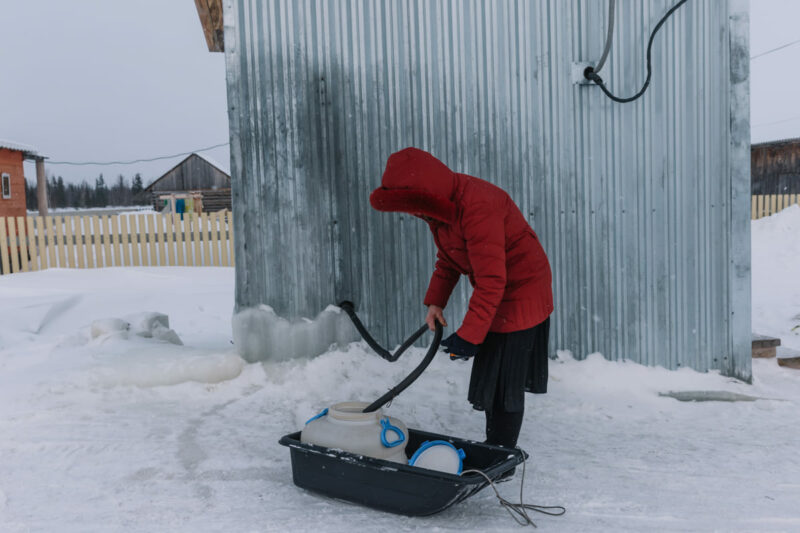
After the accident at Vorkuta's treatment facilities, some residents of Petrun had to give up the habit of fetching water from the river. Photo: Natalia Beshkareva for Novaya Vkladka. Used with permission.
Vorkuta, a city in the Komi Republic in Russia, used to be one of the centers of the infamous Soviet Gulag camp system. The Gulag might have vanished, but people still remain in the area, both Indigenous Komi people and others. The Russian independent media outlet Novaya Vkladka (The New Tab) has written about an ecological catastrophe that has damaged the Vorkuta river network.
In Russia's Komi Republic, environmental activists have been long trying to get answers from officials about an accident at a wastewater treatment facility in Vorkuta in December 2022. Since the accident, the river water has been contaminated, and parasites have been found in the river fish, but few people are considering the consequences of this emergency.
Meanwhile, the mayor of Vorkuta is preoccupied with fighting “fascism” in Ukraine, and the prosecutor's office has completely overlooked people who use water from the river. Some activists are trying to draw attention to this and other environmental problems. The authorities, however, have denounced them as “pseudo-ecologists” and “foreign agents.” The plight of people in remote villages of Komi and the consequences of the major man-made accident do not worry officials or even some residents of the Komi Republic villages, according to the journalists Natalia Beshkareva and Evgenia Sibirtseva of the Novaya Vkladka media. Global Voices translated and re-published Novaya Vkladka‘s article with permission. It has been edited for style and length.
An accident in Vorkuta
“The walls, the work booth, the pipes — everything went underground,” the workers explained about the accident at the water treatment facility in Vorkuta. Miraculously, people were not injured — the collapse occurred just a few minutes before the shift operators were supposed to enter the hall. Hot and cold water gushed out of the collapsed pipes, and the water pumping station, along with the equipment, flooded in just a few minutes. Sewage flowed directly into a stream that feeds into the Vorkuta River. The accident happened before the New Year when many Vorkutins were busy with pre-holiday chores. Two weeks later, city officials reported that the wastewater treatment plant had been restored. But in February, Rospotrebnadzor (the administrative body that watches over such facilities) reported that in the Vorkuta River, the concentration of some harmful substances exceeds the norm by several dozen times.
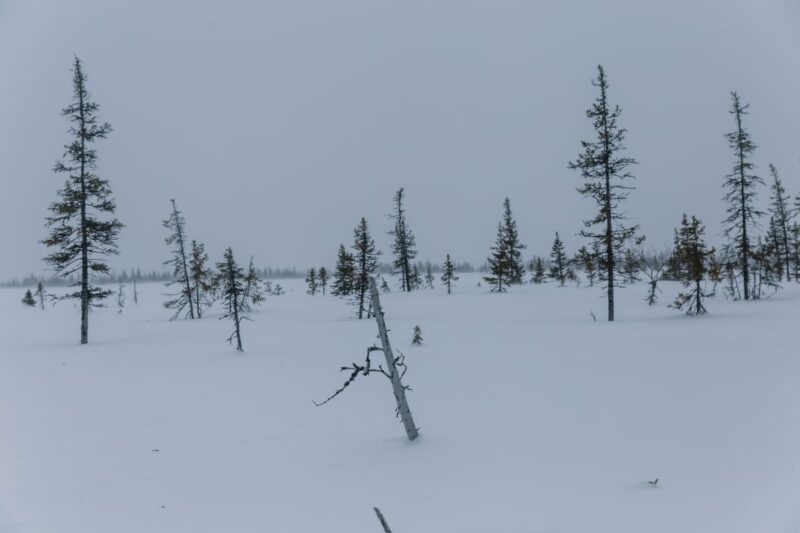
Distances to remote northern villages in Russia are measured not so much in kilometers as in hours. From the city of Inta to the village of Petrun there is about 100 kilometers. The fastest way to get there is by helicopter — in about thirty minutes. But in the off-season, it operates only once a week. And for the duration of the “winter road” it is replaced by a public shift bus or personal snowmobiles. Then the journey through the tundra can last anywhere from four to twenty hours. Photo by Natalia Beshkareva for Novaya Vkladka. Used with permission.
Residents of Komi were not officially notified about the pollution of the river. In April, some departments, including the Komi Ministry of Health, received a letter from the regional Rospotrebnadzor. It says that in the first two months of 2023, the incidence of helminthiasis in Komi increased by an average of almost 30 percent compared to the same period in 2022. This data was not included in the mayor's office's news report or in the regional government's press releases.

The pre-digital world order reigns in the village of Petrun. There is still no cellular communication and Internet, and horses are still used as transport. Photo by Natalia Beshkareva for Novaya Vkladka. Used with permission.
On December 31, the Department of the Investigative Committee for the Komi Republic opened a criminal case over the river pollution. Later, in February, another case was opened about the negligence that led to the damage. According to the Komi Prosecutor's office, the damage to aquatic biological resources as a result of the accident amounted to more than RUB 11 million (about USD 157,000). The perpetrators have not yet been named.
Six months later, the accident seemed to have been forgotten. On weekends, the commuter train is full of Vorkutins who calmly go fishing at the Seida station. However, resident Vladimir Tishchenko told the New Tab that in June, he caught a grayling fish, but he had to throw it away because there were long white worms inside.

River fish is both the main food staple for tourists and residents of polar villages. Photo by Natalia Beshkareva for Novaya Vkladka. Used with permission.
The wastewater treatment plant in Vorkuta was put into operation in the 1970s and hasn't been updated since. Since the accident, the Vorkuta administration has not announced whether the treatment facilities will be reconstructed and, if so, when. Mayor Vladimir Shaposhnikov wrote that it would take at least three to five years just to find and raise funds to reconstruct the water pipeline.
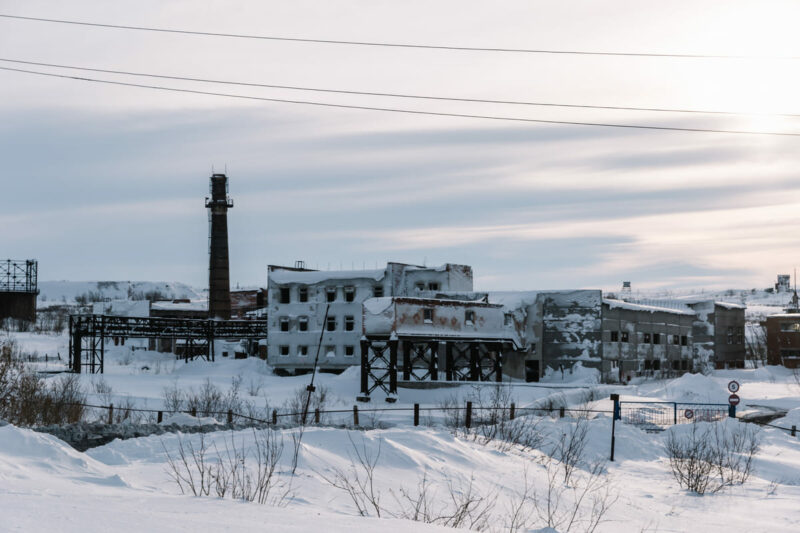
The territory of Vorkuta's “Vodokanal” treatment facilities. Photo by Natalia Beshkareva for Novaya Vkladka. Used with permission.
The New Tab found a document that indicated the treatment facilities in Vorkuta were meant to be repaired ten years ago, but the work never started. Employees of the plant say that they have been trying for years to alert the city authorities about the critical condition of technical structures. “It's just scary there: cracks in the walls, beams are rotten and bent,” said a worker who was supposed to clean the basement of the sewage treatment plant.
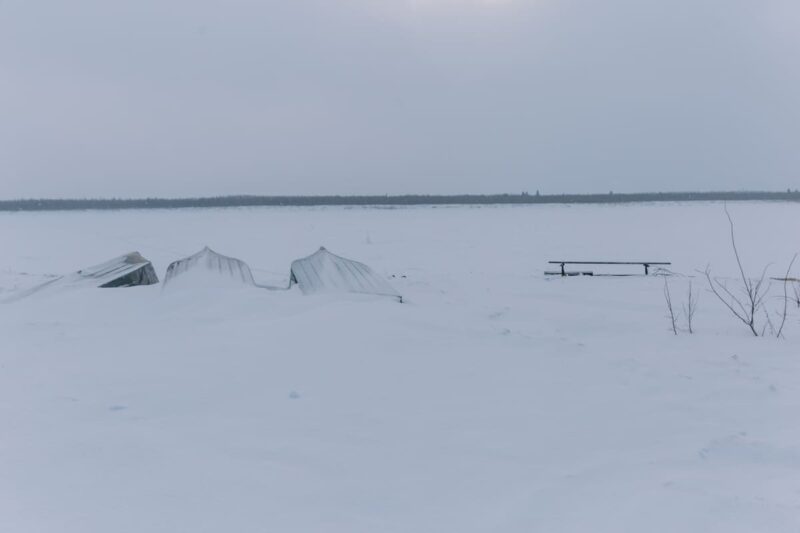
It is impossible to live on the river and not have a boat. Therefore, almost every resident of Petrun has their own river transport, which allow them to access the forest for mushrooms, to hunt, or to go to the city on business. Photo by Natalia Beshkareva for Novaya Vkladka. Used with permission.
In February 2023, the Prosecutor of the Komi Republic, Nikolai Egorov, confirmed that the Vorkuta administration knew about the dilapidated state of the treatment facilities. In 2020, the authorities even ordered a technical inspection of the structures, but no measures were taken after that. In January 2023, a State Duma deputy from Komi, a member of the Communist Party Oleg Mikhailov, called the inaction of officials “a crime” and suggested contacting the Prosecutor General's Office about this. But Mikhailov's initiative was not taken seriously — the deputies of United Russia, who are in the majority in the State Duma, evaded the vote.
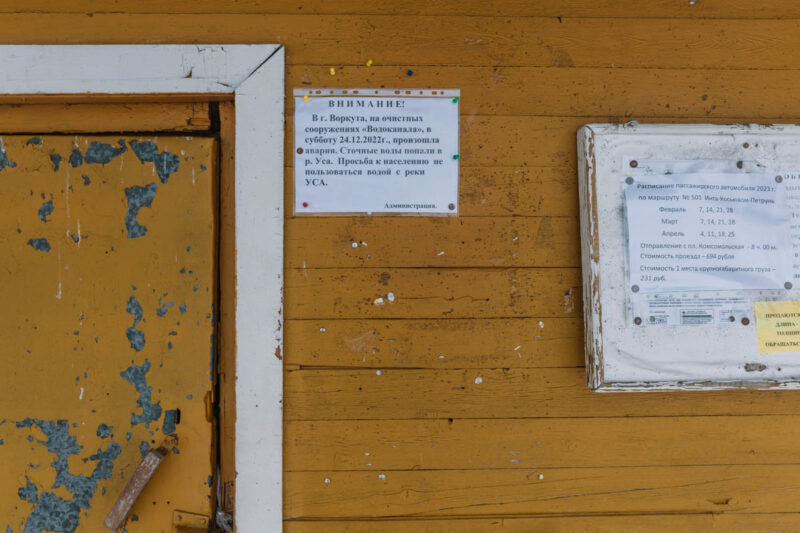
Residents of some Komi villages learned about the emergency from notices at grocery stores which appeared at the end of December: “An accident occurred at the Vodokanal treatment facilities in Vorkuta. Sewage got into the Usa River. A request to the population not to use water from the river.” What exactly happened and how serious it was, no one knew. Photo by Natalia Beshkareva for Novaya Vkladka. Used with permission.
Local media, following the city authorities, spoke about the accident as a minor incident. This message was shared by several outlets on December 24 on numerous social networks:
В сети разгоняют не вполне адекватные слухи, что локальный инцидент на очистных „Водоканала“ угрожает „экологической катастрофой“. Спите спокойно, воркутинцы, всё под контролем специалистов, угрозы экологии нет.
Not quite adequate rumors are being dispersed in the network that a local incident at the Vodokanal treatment facilities threatens an ‘environmental catastrophe.’ Sleep well, Vorkutins, everything is under the control of specialists — there is no threat to the environment.
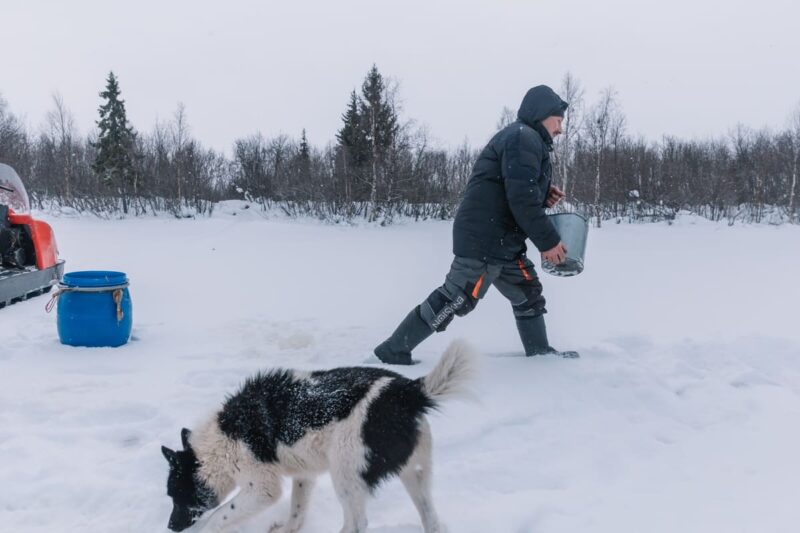
Although there are two water pumps in Petrun, Gabriel Filippov refuses to use them. The artesian water running there seems to him inanimate, not like the soft and delicious from the Usa River. But when the river was poisoned by the sewage drains of Vorkuta, Gabriel replaced it with lake water. And instead of going to a water pump near the house, he walks three kilometers to the lake. Photo by Natalia Beshkareva for Novaya Vkladka. Used with permission.
Veronika, a Russian and literature teacher living in Vorkuta, is surprised that the news about the accident was presented as “something insignificant.” She said, “[It was talked about] along with the weather information as if nothing terrible had happened. As a sensible person, I immediately imagined the damage caused to the environment. It struck me that no one in Vorkuta reacted sharply to this. Everyone took it as something ordinary.”
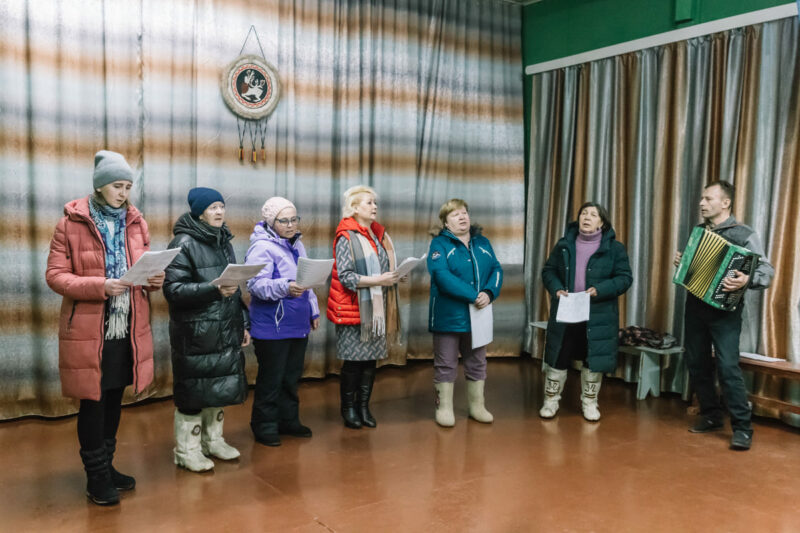
All the main entertainments of Petrun village are concentrated in the community club: a circle of young bayanists, a dance studio, a choir (pictured). Photo by Natalia Beshkareva for Novaya Vkladka. Used with permission.
It seems the scale of the incident was realized only by the station staff, activists, and officials. Syktyvkar ecologist Nina Ananina warned that the rates of intestinal infections and helminthiasis may increase in settlements downstream of the river. Officials were silent about this. There were no reports of an accident at all on the website of the Government of the Komi Republic either on the day of the emergency or in the following days.
Worms and black water
Residents received much more information about the accident and its consequences from the social media of the Pechora Rescue Committee, a public environmental organization established in 1989. Its head, Ivan Ivanov, called several state institutions after the accident, including the Vorkuta Rospotrebnadzor, trying to find out if residents of villages could continue using the river for drinking water. But he did not receive a meaningful answer. As a result, the Pechora Rescue Committee recommended residents not eat raw fish caught in the river and not use the river water for cooking. After the city authorities and the head of Komi, Vladimir Uiba, reported that they would begin treating the contaminated water, activists of the Pechora Rescue Committee took water samples from the Vorkuta and Usa rivers and sent them to a laboratory for analysis.
According to the results, coliphage viruses, salmonella bacteria, helminth eggs, and various types of bacteria were found in the water, indicating fecal contamination of rivers. This type of contamination can be incredibly dangerous — even fatal — according to the World Health Organization.
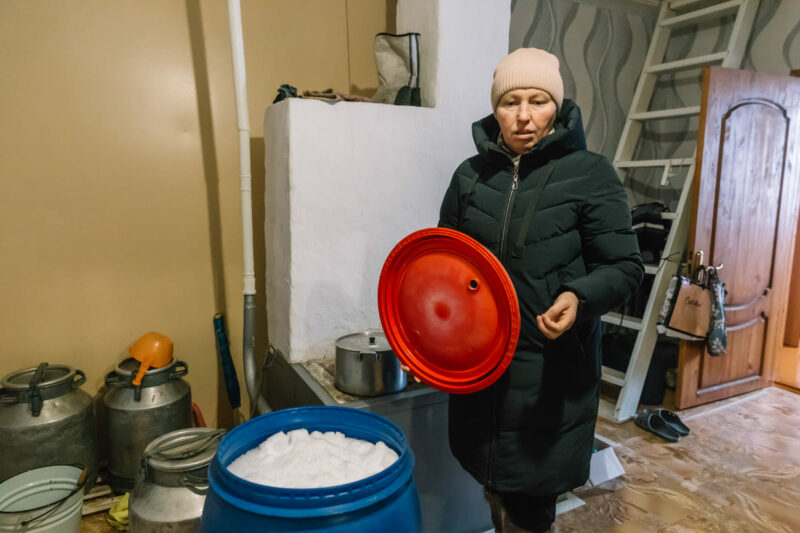
Irina Filippova's spouse brought a flask filled with snow and added water from the lake. This supply will last them a week for making tea. Photo by Natalia Beshkareva for Novaya Vkladka. Used with permission.
In response, the Komi Prosecutor's office stated that though untreated sewage was discharged into the Vorkuta and Usa rivers from December 24 to January 11, there are no settlements whose residents use water from the river within 540 kilometers of the river from Vorkuta to Usinsk.
In reality, there are about a dozen villages between Vorkuta and Usinsk, and people living there regularly take water from the river.
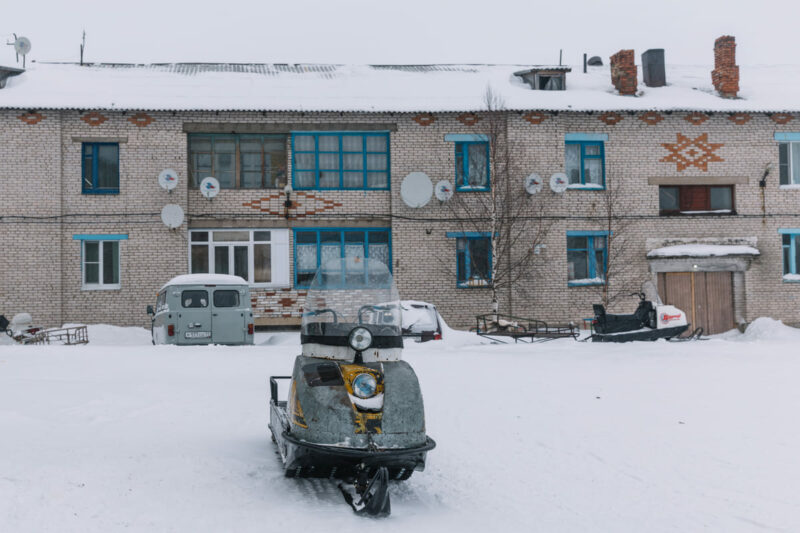
A housing complex in the Village of Abez. The most essential mode of transportation in these parts during winter is a snowmobile. Photo by Natalia Beshkareva for Novaya Vkladka. Used with permission.
These villages seem to have been “forgotten” both by the prosecutor's office and the regional government. The journalist of the New Tab traveled to these “invisible” settlements in February. The accident was treated differently there: those who used the internet and read posts from environmentalists were worried about the rivers, while those who got their news primarily from TV believed that nothing terrible had happened. In some of the villages, there is no internet, no communication from the state or regional health organizations. When journalists finally came to the villages, people got what they had not received from the authorities for a long time — information.
One of these circumpolar villages cut off from civilization is Petrun. A little more than 300 people live here, almost all speak the Komi language (in recent years, it has practically disappeared, only a small percentage of the population speaks it in Komi). There are two small grocery stores in the village and a wooden boarding school for 30 students that has long been in need of repair.
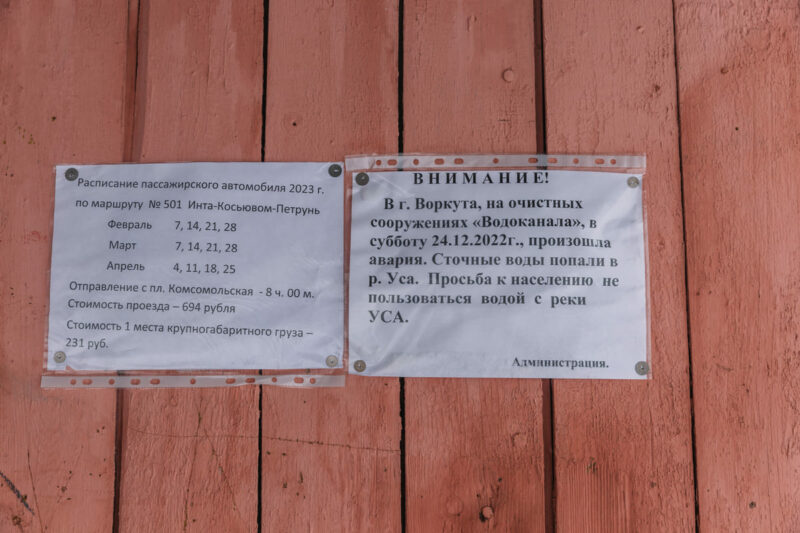
All warnings that the city sewage system was drained from Vorkuta into the river for about a month were limited to the laconic “do not use water from the Usa River”. Photo by Natalia Beshkareva for Novaya Vkladka. Used with permission.
A local resident Vera, whose house is right on the shore, said to the journalists:
Переживаю, что летом ни порыбачить, ни покупаться будет нельзя. Вы видели, по какой дороге ехали? Понимаете, что мы никому не нужны? — сетует Вера.
I'm worried that it will be impossible to fish or swim in the summer. Did you see which road you were driving on? Do you understand that no one needs us?
The journalists have also talked to a local librarian, Natalia Atemasova, who was somewhat defensive about the river pollution.
Зачем об аварии писать? Стиральные машины стирают, и никто не полощет на реке, как раньше. За водой на колонку сколько надо ездишь, баню топишь когда хочешь! Летом для огорода вода в бочках от дождя собирается. Лучше напишите, как в селе замечательно. Вон сколько продуктов в магазине — не в каждом посёлке столько бывает. Вертолёт летает, слава богу и властям. У нас всё хорошо, лишь бы Путин подольше был у власти.
Why write about the accident? We use washing machines now; no one washes clothes in the river, as before. You go to the pump for water as much as you need, you heat the bath whenever you want! In summer, water is collected in barrels from the rain for the garden. It's better to write how wonderful it is in the village. The helicopter is flying, thank God and the authorities. Everything is fine with us, as long as Putin is in power longer.
The villagers do not know how to check the water quality. In Petrun, there is no biology teacher at the school, the paramedic station is closed because they could not find a replacement. Petrun residents found out from TV and radio news that the damage at the sewage treatment station had been fixed, but officially, no one has notified them whether it is safe to drink water from the Usa river.
Abez is a village on the banks of the Usa River. In the early 2000s, it had more than 700 inhabitants, though now only about 400. Unlike Petrun, Abez has cellular service and internet and can be reached by train. But they know no more about the water quality there, and the accident itself has faded against the background of other household problems.

A resident of Abez came to the water column to fill up tanks with water. Photo by Natalia Beshkareva for Novaya Vkladka. Used with permission.
After learning about the arrival of the New Tab journalists, one of the residents organized a meeting.
“Do you just want to know about the river? If so, then there is nothing to talk about with you! We have enough other problems,” says one local resident.
Residents of Abez do not take water from the Usa river — there is a central water supply and a public pump for the community. But the river is an important part of life in the village, so people had a lot of questions.
“Do I really have to give up fishing?” “Will it be possible to rest by the river after floods when bacteria and helminth eggs will spread along the banks?” “How can they keep children from swimming in the river in the summer?”
All these questions were quickly drowned out by other more painful problems. Residents talked about the absence of a landfill and about stalled repairs to the municipal housing units that most people there rely on. Against this background, the impurities in the Usa River do not seem so important to the residents of Abez.
“The desire to do something disappears.”
While residents of the northern villages were wondering when it would be possible to drink water from the river, the Pechora Rescue Committee continued to wage a paper war with officials. In addition to preparing endless letters to officials at all levels of government, environmentalists appealed directly to the head of the Komi Republic, Vladimir Uiba, with a request to introduce an emergency protocol, but he responded that there was no need for this.
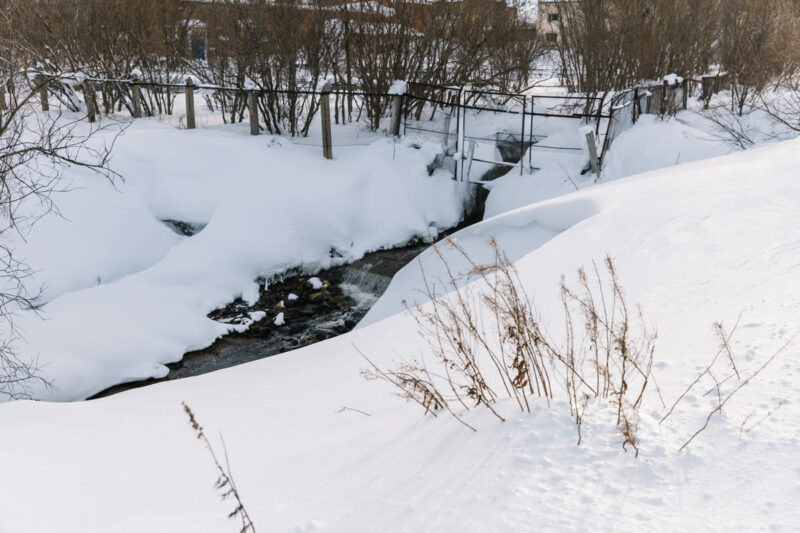
Sewage drains from the Vorkuta sewage treatment plant flow into the Parallel Stream. The station's employees say that even six months after the accident, a full-fledged cleaning has not been established here. Neither the Vorkuta City Hall nor Vodokanal have made public the analysis data of the water discharged into the river. Photo by Natalia Beshkareva for Novaya Vkladka. Used with permission.
Meanwhile, the mayor of Vorkuta, Yaroslav Shaposhnikov, announced at the end of March that he would go “take part in a special military operation” — meaning Russia's war against Ukraine. After the news was released online, some Vorkutins began to leave comments asking who would then deal with the problems in the city. As a result, the ability to write comments under this post was shut down. When in May, the mayor explained that he was going to “help the Motherland defeat fascism on the territory of Ukraine,” the Vorkutins began to write to him again about the problems in this very Homeland: unrepaired roads, unplowed snow, and more. There were so many such “reminders” that commenting on the post was closed soon after, once again. So far, Shaposhnikov remains in Vorkuta.
According to the head of the Pechora Rescue Committee, Ivan Ivanov, he is very upset by the passivity of residents. After the accident at the sewage treatment plant, almost no one tried to get an answer from officials, people were limited to comments on social networks at most. In the public “Civil Society of the Komi Republic” VK group (a popular Russian social media app), residents were told to send mass appeals about the accident to various governmental departments, including the Prosecutor General's Office and the reception of the president. The activists even attached a pre-written letter to the post. But, judging by the lack of reaction of the authorities, almost no one followed through in sending this letter. “I don't see for whom [of the residents] it is necessary — and this causes burnout,” says Ivanov. “The desire to do something disappears.”
Post a Comment